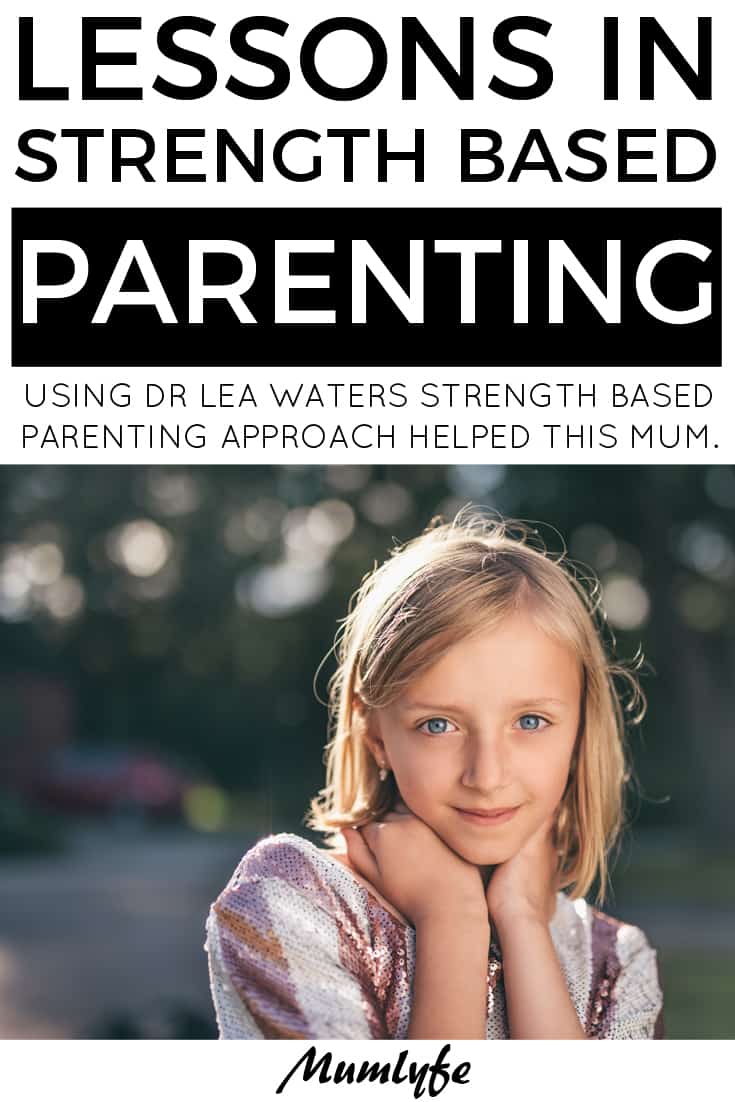When my son’s school announced that they’d arranged for Dr Lea Waters, founding director of Melbourne-based Centre for Positive Psychology and author of The Strength Switch, to present on strength based parenting, I was interested. ‘Strength based parenting’, was a term I’d heard but didn’t really understand.
Amateur parent
Like many parents, I often feel a bit of an amateur as a parent. At best I’m one step ahead of my kids, 13 and 10 years old, but often way behind, struggling to make sense what I can do to help them. How we encourage, direct, correct, support and have fun with our kids has such an influence on their confidence, motivation, and compassion for themselves and others.
“Did I go over the top in praising them today – did I make too much of a big deal?”
It also impacts on the skills and knowledge our kids are developing. So often, though, it feels like we are parenting on the fly – or over-analysing it, as I tend to do. Or, worse, we do both at the same time (a particular speciality of mine): retrospectively thinking about what we should have done differently.
Overthinking it
For example, here are some of the thoughts that are going through my mind as I write this:
• Have I been noticing enough of what my kids have been doing over the past week?
• Was I overly critical yesterday about the fact that they didn’t clean up after themselves?
• Did I go over the top in praising them today – did I make too much of a big deal?
• My daughter’s organising her own activities. That’s great – I think – eek, maybe it’s not, maybe she’s becoming too distant from me.
• Why does my son check in about what he is allowed to eat? Am I creating someone without initiative, or is he showing respect in case I need those ingredients?
• In essence, am I raising these kids well enough?
There’s so much judgment in these thoughts, isn’t there? We’re constantly evaluating ourselves as well as our kids – no wonder we’re feeling tired! As I repeat the same phrases to my kids, over and over, I’m also realising that my approach isn’t effective either. I also wonder whether this constant critiquing is creating a barrier between parents and kids.
Thoughts on this: 5 techniques I’m using to stop criticising my kids
Since attending Dr Waters talk and reading her book, I’ve drawn on a lot of her key messages and implemented her approach with my kids. Here are my most useful takeaways from her strength based parenting approach.
4 things I’ve learned about strength based parenting
1. What strength based parenting actually means
Always a good start! The idea behind strength(s) based parenting is that we all have innate strengths and weaknesses, and in focusing on our child’s strengths, we enhance their self esteem and energy. Plus it’s more rewarding for us as parents. How good would that be!
Strength based parenting enables you to work with your children, rather than constantly battling against them.
Traditional approaches have often focused more on overcoming weaknesses but, if this becomes our main focus, it is counterproductive. It will be exhausting for us all (particularly given the natural resistance we all have to work on something we don’t enjoy or think we are good at), and we are unlikely to help our kids become more than competent (which isn’t very satisfying).
More on this:Strengths based parenting: Focus on the cans, not the can’ts
If we draw on our children’s strengths, which come more naturally and deliver more positive outcomes, our kids are more likely to build resilience, optimism and achieve – beyond ‘competence’ – in areas that are meaningful for them. Plus, when it is working well, strength based parenting enables you to work with your children, rather than constantly battling against them.
Put like this, it seems the way to go, doesn’t it?
2. How to identify your child’s strengths
I hadn’t given a lot of thought to what my children’s strengths might be. If I had, I might have leaned mostly towards their skills and talents, like which types of subjects or activities they enjoy and do best in. Although cognitive and physical skills can be important, personality or character traits are also significant. Personality traits include aspects like courage, humanity, sense of justice, self control and sense of purpose.
I also discovered a vocabulary to identify strengths. Did you know that at least 120 different strengths have been identified by various academics? Within this suite of attributes, there are sure to be some which apply to your child.
Personality traits include aspects like courage, humanity, sense of justice, self control and sense of purpose.
While knowing how to describe strengths is helpful, so too is how to identify them in your child. Strengths tends to have three elements:
• They are things your child is ‘naturally’ good at;
• They are things your child gains energy from using, which you will see from their focus when using their strength, as well as their enjoyment and/or pride;
• They are things your child enjoys doing. You will find them stepping up to lead a group, or to include someone who is being excluded, for instance. Or find them practising their skills without being asked.
Looking at all three elements helps to determine whether this is a key strength or not for your child.
3. You don’t just ignore all weaknesses – but you probably should ignore some
Weaknesses, obviously, are quite different to strengths. And there are some things we are not good at or don’t enjoy that we have just needed to learn how to do. It isn’t the case for everything though. So how do you decide?
It’s important to consider which weaknesses are actual important to focus on.
We are not likely to be strong in every potential trait. In most cases, the best we can achieve in those areas where we are weak is a level of competency, and this is likely to take a lot of effort. So it’s important to consider which weaknesses are actual important to focus on.
Weaknesses need to be addressed if they affect your child’s ability to be happy or effective. That may mean maintaining a level of tidiness in order not to constantly lose homework. Or helping your child with some techniques so they can remember not to be late to important events. Or training them to develop a level of proficiency in a compulsory school subject.
Developing your child’s strengths may also help them overcome key areas of weakness. As Dr Waters said, “A strong child is one who can simultaneously play to his strengths while working on his weaknesses, because his solid self identity gives him the foundation he needs.”
4. Applying a strength based parenting approach
It’s one thing to know the theory, and another to apply it.
I am finding, like most things, that taking a strength based approach to parenting takes some effort. It’s easy to slip back into old habits unless you think about how you can apply and work with your circumstances. Once you and your children have identified their strengths and areas to work on, there are many measures to build on these.
Where possible, anticipate and prepare for challenging times, and take the opportunity to reflect with your child afterwards.
There are a range of ways you can acknowledge and work with your child. Most of them you probably have heard of previously, in other contexts. They include:
• being realistic about attention spans (but still noting they can improve);
• the importance of gratitude;
• allowing downtime for minds to wander;
• and teaching and demonstrating mindfulness, self-control, and effective communication approaches.
Where possible, anticipate and prepare for challenging times, and take the opportunity to reflect with your child afterwards.
Before using these, take the opportunity to assess your own strengths and weaknesses. What is likely to be most effective is an approach that builds on your strengths and your children’s. Maybe it’s a shared sense of humour, or the ability to notice and comment. Maybe holding onto something tangible – written notes or texts, for instance – will be more sustainable for you, and more appreciated by your child.
Try this:This SWOT analysis for parents may be a game-changer
After that, it’s time to experiment and adjust as circumstances change. The strength based parenting approach is not a quick fix. It’s an approach to relationship development and self-development, for both of you – an approach to life, really.
Where to find out more
The Strength Switch lists various websites you can review (if the contents within the book are not enough!) and The Strength Exchange website is co-authored by Dr Waters.
One link I’ve found particularly helpful is the Values in Action Institute’s website to be able to express, and help identify, strengths and weaknesses. It’s a great start.
Best wishes on a more positive approach to parenting!
Image by Janko Ferlič



How to stop worrying about what other people think | Mumlyfe
Sunday 22nd of September 2019
[…] Read more: 4 lessons in strengths-based parenting […]
Helping your child overcome perfectionism | Mumlyfe
Sunday 19th of May 2019
[…] 4 lessons in strengths-based parenting 5 strengths-based parenting tips to focus on the good Strengths-based parenting: Focus on the cans, not the can’ts […]
Stop asking 'what's wrong with me?' and ask what's right instead | Mumlyfe
Tuesday 25th of September 2018
[…] […]